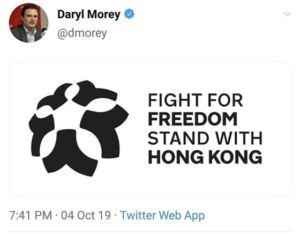Group Gordon’s Kerry Close gives a play-by-play of the NBA’s crisis that jeopardized fans’ support for the brand and opportunities in the growing Chinese market.
 The NBA found itself at the center of a global controversy last week when Houston Rockets’ General Manager Daryl Morey tweeted in support of pro-democracy protesters in Hong Kong. Morey’s comments immediately drew ire from Chinese companies who withdrew their sponsorship of the Rockets, putting the NBA in a highly sensitive position. The league is known for being comparatively progressive in the sports world, giving its players and staff a lot of leeway to opine on political issues. Yet China is also a strategically significant market for the league, one from which it draws about 10% of its revenue. Morey’s tweet put the NBA in a no-win situation.
The NBA found itself at the center of a global controversy last week when Houston Rockets’ General Manager Daryl Morey tweeted in support of pro-democracy protesters in Hong Kong. Morey’s comments immediately drew ire from Chinese companies who withdrew their sponsorship of the Rockets, putting the NBA in a highly sensitive position. The league is known for being comparatively progressive in the sports world, giving its players and staff a lot of leeway to opine on political issues. Yet China is also a strategically significant market for the league, one from which it draws about 10% of its revenue. Morey’s tweet put the NBA in a no-win situation.
The NBA’s official response reflects this conflict, as the league expressed sympathy toward both sides of the issue. But in doing so, it managed to create a separate crisis.
Statement from NBA re: Daryl Morey’s controversial tweet: pic.twitter.com/6IJv9FJF4T
— Tim MacMahon (@espn_macmahon) October 7, 2019
By not taking a firm stance on the issue, the league created more confusion and gave the story an unnecessary extra few days in its lifecycle. The NBA’s statement offers a few crucial lessons for companies when developing responses to sensitive or controversial situations:
Perhaps the most significant critique of the NBA’s crisis response was that it did not take a firm position. By expressing sympathy for those offended in China on one hand, while defending Morey’s right to free speech on the other, its response alienated audiences at home and abroad. Even worse, it came across as inauthentic and damaged the league’s credibility with those on both sides of the controversy. Its ambiguity also created the need for the NBA to release a follow-up statement to clarify its original position, which extended the media conversation around the issue for another several days. Unless it was prepared to take a clear-cut stance, the NBA should have reconsidered issuing a statement at all.
The issue was also compounded by the fact that the NBA released separate statements—in English and Mandarin—in response to Morey’s tweet. The Mandarin statement was far more apologetic in tone than the one released to Western media. When the translated statement was reported in Western media, the disparities between the two statements further undermined the NBA’s credibility, and also created yet another conversation around an undesirable topic for the league.
This is certainly not the last time that the NBA and other professional sports leagues eyeing international expansion will face politically sensitive situations, particularly with regard to comments or actions from players, staff, and affiliates. Moving forward, the league should develop a standard operating procedure in response to similar issues that will likely come up again in the future. That way, it will be able to call upon an established course of action and maintain consistency in its operations and communications amid a crisis situation.
The NBA’s crisis highlights the need for consistency and clarity in communications with the public, the media, and stakeholders. By failing to take a firm stance on an issue in an attempt to placate audiences at home, and support business ties in China, the league exacerbated an already precarious situation and damaged its credibility and authenticity.
By making a clear and unequivocal statement, companies benefit in the long term by appearing decisive and principled. While they may come under fire from some, the overall reputational advantages extend far beyond a day’s worth of bad headlines.